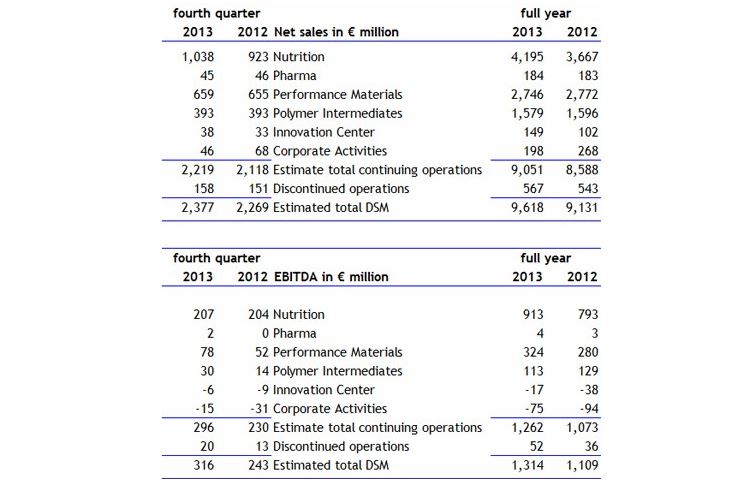Its nutrition arm – its biggest, and which includes human nutrition, specialty ingredients like enzymes and animal nutrition – in 2013 delivered 15%+ more EBITDA profit than 2012 when, the figure was €793m on €3.667bn sales.
For the final quarter, EBITDA rose €3m to €207m year-on-year, on sales of €1038m compared to €923m in 2012.
Chief Financial Officer (CFO) Rolf Dieter-Schwalb told us a, “confluence of completely unrelated events” had hit the world’s biggest food ingredients supplier’s nutrition activities. Royal DSM also has pharma, performance materials and polymer intermediates divisions.
Omega-3
Omega-3 – a sector DSM has invested about €1.2bn in by buying Martek Biosciences and Ocean Nutrition Canada in recent years – continued to struggle in the face of challenging scientific publications, and supply issues.
A poor yield in the Peruvian anchovy fishery that is the primary source of omega-3s saw the price of crude oil jump as much as 70% over the year.

“So the likes of Walmark [US retailer] put prices up 25-30% and some of it was margin building and that affected sales,” Dieter-Schwalb said.
“Then the omega-3 sector and the whole supplements sector has been hit by studies questioning supplement use but there are always other studies showing supplement benefits and we expect the market to pick up this year although perhaps not so much in the US which appears somewhat saturated."
“But the opposite is the case in the rest of the world including high-growth economies like Germany and developing economies in Asia and other parts of the world.”
The anchovy fishery is also showing signs of a greater yield this year which will put downward pressure on pricing.
Vitamin E
Vitamin E sales, especially in animal nutrition, were affected by outbreaks of bird flu and other animal-borne diseases in Mexico, China and south East Asia.
A rumour that a new Chinese supplier was going to enter the fray with a mega-facility had affected price but Dieter-Schwalb noted nothing had as yet happened on that front. “There is nothing at the site, no workers. So it is just speculation.”
Rise of private label
The food and beverage market was also sluggish in North America and Europe, a hangover from the prolonged economic slowdown that remained after the 2008 financial market collapse.

“Look at the Unilever results from today – consumers are going for lower price points and shifting to private label,” he said, while noting infant formula remained strong.
“But we will not target that end of the market unless they are willing to pay our prices. We remain about value over volume. The European ‘A-brand’ food and beverage sector has recorded 10 consecutive quarters of lower volume so it is hard to say when this might change.”
“But the global population continues to grow so it can’t last forever.”
“With all these strategic headwinds the result of 20% EBITDA on revenues is not so bad.”
He said the company would continue to consolidate its recent acquisitions rather than seeking further substantial investments, although, “interesting smaller propositions are a possibility.”
Across all its divisions, DSM recorded sales of €9.618bn for the year compared to €9.131bn in 2012, with EBITDA coming in at €1.314bn (€1.109bn in 2012).
Moving forward
CEO/Chairman of the DSM Managing Board, Feike Sijbesma, said the nutrition division would recover from the difficult period.
“This business with its broad, global offering across the value chain is well positioned to benefit from the structural megatrends, with the need to nourish a growing and aging global population, living increasingly in urban areas, paying more attention to health and well-being,” he said.
“This will continue to drive increased demand for nutritional ingredients.”
